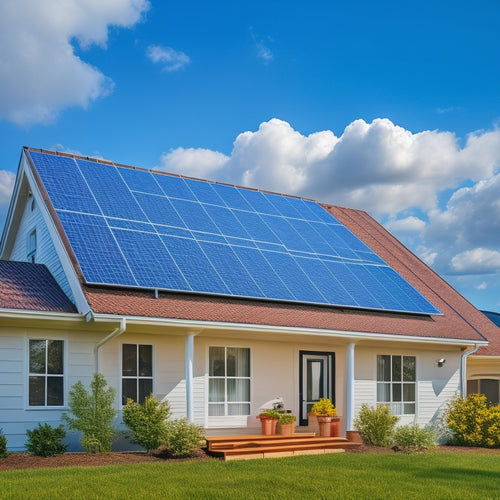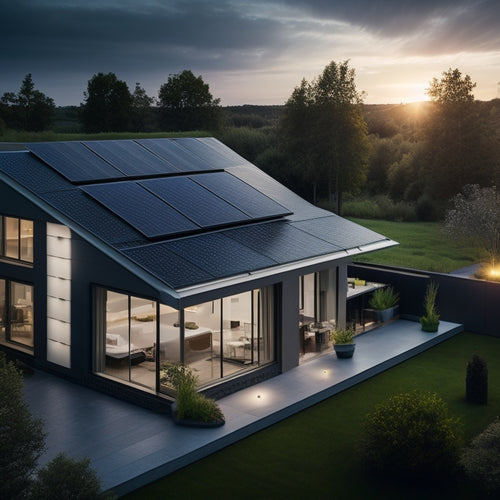
Price for Home Solar System
Share
As you consider investing in a home solar system, you'll want to weigh the upfront cost against the long-term benefits, including zero energy bills and increased property value. High-efficiency solar panels can greatly reduce your energy consumption, and analyzing your daily energy usage helps tailor a system to your specific needs. Manufacturers offer warranties ranging from 25 to 30 years or more, ensuring your investment in a durable system. When evaluating prices, consider factors like system size, panel efficiency, and warranty length. Now that you've got a better understanding of the basics, you can start exploring how to optimize your solar system for maximum savings and returns.
The Essentials
- The cost of a home solar system varies depending on factors such as system size, panel efficiency, and installation company.
- Federal rebates and incentives, including a 26% tax credit, can significantly offset the initial cost of a home solar system.
- High-efficiency solar panels with advanced cell technology may be more expensive upfront, but they provide maximum energy output and long-term savings.
- The size of the solar panel system needed depends on daily energy consumption, which can be assessed by reviewing past utility bills and identifying energy usage patterns.
- Homeowners can expect to save money monthly on energy bills, with potential long-term savings of $15,000 or more on property resale value.
Zero Energy Bills
You'll likely reduce your energy consumption greatly with a home solar system, which translates to substantial monthly savings.
By generating your own electricity, you'll offset your energy bills, potentially eliminating them altogether.
With a reliable source of Renewable Energy Solutions and a battery pack, you can store excess energy for later use, ensuring a steady supply of power even during outages.
With zero energy bills, you'll enjoy a predictable and lower cost of homeownership.
Reduce Energy Consumption
Frequently, homeowners who invest in a home solar system do so with the primary goal of reducing their energy consumption and, ultimately, slashing their energy bills to zero.
As you venture into the world of renewable energy, it's crucial to understand that reducing energy consumption is a critical step towards achieving this goal. By embracing energy independence with residential power solutions, such as home battery storage, you can further reduce your reliance on the grid and optimize your energy usage.
One effective way to do this is by incorporating energy-efficient appliances into your daily routine. These appliances, such as LED bulbs and Energy Star-rated refrigerators, use markedly less energy than their traditional counterparts, resulting in a substantial decrease in your overall energy consumption.
Additionally, smart home technology can play an important role in optimizing your energy usage. By installing smart thermostats and smart plugs, you can monitor and control your energy usage in real-time, making adjustments as needed to minimize waste.
Save Money Monthly
By switching to a home solar system, you're not only reducing your carbon footprint but also cutting down on your monthly expenses. With solar panels, you'll generate clean energy and reduce your reliance on the grid, leading to considerable savings on your electricity bills.
By utilizing the power of the sun, you'll also mitigate the uncertainty of energy price fluctuations, offering a reliable and long-term solution that protects you from volatile electricity rates Renewable Energy Solutions. Additionally, solar power systems provide a sustainable and eco-friendly alternative that considerably reduces carbon emissions.
As a homeowner, you'll benefit from solar incentives and federal rebates, which can considerably offset the initial investment in your solar system. The federal government offers a 26% tax credit on the total cost of your solar system, and some states offer additional incentives.
These benefits can help you break even on your investment in just a few years.
With a home solar system, you'll enjoy zero energy bills, giving you the freedom to allocate your hard-earned money elsewhere. Imagine having extra cash to spend on the things that matter most to you, like travel, education, or retirement.
Increases Property Value
When you install a home solar system, you're not only reducing your energy bills, but you're also increasing your property's appeal and value.
By utilizing renewable energy for homes, you're contributing to a sustainable future and making your home more attractive to environmentally conscious buyers.
You'll attract potential buyers who are willing to pay a premium for a sustainable and energy-efficient home.
In fact, studies have shown that solar-equipped homes can sell for up to 17% more than similar non-solar homes.
Enhanced Property Appeal
Installing a home solar system can enhance your property's appeal, setting it apart from neighboring homes and potentially increasing its value. A well-designed solar panel installation can even become a unique selling point, making your property more attractive to potential buyers.
Solar aesthetics play a significant role in this enhanced appeal, as sleek and modern solar panels can complement your home's design and structure.
Moreover, a solar-powered home can have a positive neighborhood impact, contributing to a more environmentally conscious and forward-thinking community.
As more homeowners invest in renewable energy, the overall desirability of the neighborhood increases. This can lead to a ripple effect, inspiring others to adopt sustainable practices and investments, ultimately elevating the area's appeal and charm.
Increased Resale Value
As you consider the benefits of a home solar system, one of the most notable advantages is its impact on your property's resale value.
Installing solar panels can increase your property's appeal, making it more attractive to potential buyers. According to market trends, homes with solar systems sell faster and for higher prices than those without. In fact, a study found that solar panels can increase your property's value by up to $15,000.
You'll also benefit from tax incentives, such as the Solar Investment Tax Credit (ITC), which allows you to claim a credit of 26% of the total cost of your solar system. This can considerably reduce your tax liability, providing even more savings.
When you decide to sell your property, the increased resale value will give you a competitive edge in the market. With a home solar system, you'll not only reduce your energy bills but also enjoy a higher return on investment when you sell your property.
High-Efficiency Solar Panels Used
When you opt for high-efficiency solar panels, you're investing in advanced cell technology that maximizes energy output.
This technology enables the panels to convert a higher percentage of sunlight into electricity, resulting in more power per hour of sunlight.
By choosing top-rated solar panels for residential use renewable energy, you can rest assured that you're getting the best performance for your home.
With maximum energy output, you can generate more electricity and reduce your reliance on the grid.
Advanced Cell Technology
By leveraging state-of-the-art advancements in photovoltaic technology, home solar systems now incorporate high-efficiency solar panels featuring advanced cell technology.
This breakthrough enables you to generate more power per unit area, reducing the overall cost of your solar system. Advanced cell technology is built on solar cell innovations that have greatly improved photovoltaic efficiency.
These innovations include advancements in silicon wafer design, thinner wires, and improved surface textures, allowing for better light absorption. As a result, high-efficiency solar panels can achieve efficiencies of over 20%, compared to the standard 15-17% efficiency of traditional solar panels.
With advanced cell technology, you can expect more energy production from a smaller footprint, making it ideal for homes with limited roof space.
Maximum Energy Output
You can maximize your energy output with high-efficiency solar panels that incorporate advanced cell technology. These panels are designed to optimize energy production, ensuring you get the most out of your solar system. High-efficiency solar panels boast higher solar efficiency ratings, typically above 20%, compared to standard panels with ratings around 15-18%. This increase in efficiency translates to more power generated per hour of sunlight.
| Panel Type | Efficiency Rating | Energy Production |
|---|---|---|
| Standard | 15-18% | 250-300 Wh/m² |
| High-Efficiency | 20-22% | 350-400 Wh/m² |
| Premium | 22-24% | 450-500 Wh/m² |
Assess Your Energy Usage
You need to determine your daily energy consumption to size your solar system accurately.
To do this, you'll want to examine your past utility bills to identify your energy usage patterns, including peak usage hours and seasonal changes.
This information will help you design a system that integrates seamlessly with your energy storage technology renewable energy systems and guarantees you maximize your energy savings.
Daily Energy Consumption
The amount of electricity your home consumes daily is a critical factor in determining the size and cost of your solar panel system. To get an accurate estimate, you need to assess your energy usage patterns. This involves evaluating your energy efficiency and consumption habits.
Start by reviewing your past electricity bills to determine your average daily energy consumption in kilowatt-hours (kWh). Take note of the appliances and devices that consume the most energy, such as refrigerators, air conditioners, and lighting systems.
Next, consider ways to optimize your energy efficiency. Look for opportunities to replace traditional incandescent bulbs with LEDs, upgrade to energy-efficient appliances, and adjust your thermostat settings.
These small changes can greatly reduce your energy consumption and lower your solar panel system's required capacity. By understanding your daily energy consumption, you can design a solar panel system that meets your specific needs, ensuring you achieve maximum energy independence and cost savings.
Energy Usage Patterns
Evaluating energy usage patterns involves identifying the times of day when energy consumption peaks and troughs. This helps you understand your consumption habits and optimize energy efficiency.
You'll uncover when you use the most energy and identify opportunities for behavioral changes to reduce your peak demand. By monitoring your energy usage, you'll notice usage trends that vary by season, with increased consumption during summer months when household appliances like air conditioners are in high use.
An energy audit can provide significant observations into your lifestyle impact on energy consumption. By analyzing your energy usage patterns, you can pinpoint areas for improvement, such as adjusting your daily routine to reduce energy consumption during peak hours.
This awareness enables you to make informed decisions about your energy usage, leading to a more sustainable and cost-effective lifestyle. With this knowledge, you can optimize your energy efficiency, reduce your carbon footprint, and enjoy the freedom that comes with being in control of your energy consumption.
Longer Warranty Period
When you invest in a home solar system with a longer warranty period, you're fundamentally buying extended system durability.
This means you'll enjoy a longer period of worry-free operation, as the manufacturer will cover repairs and replacements for a more extended timeframe.
With a longer warranty, you can expect your system to perform at its best for years to come, providing you with a higher return on your investment.
Extended System Durability
Considering your long-term investment, you'll want a home solar system that stands the test of time. Extended system durability is essential in verifying your system generates electricity efficiently for years to come. This depends on the quality of system materials and installation techniques used.
High-quality materials can withstand harsh weather conditions, reducing the likelihood of component failure. Look for systems with durable panels, inverters, and mounting structures that can resist corrosion and degradation.
Proper installation techniques also play a significant role in extending system durability. A well-installed system reduces the risk of water damage, electrical faults, and other issues that can lead to premature system failure.
Confirm your installer uses industry-approved techniques and follows manufacturer guidelines to guarantee a long-lasting system.
Frequently Asked Questions
Can I Install Solar Panels on My Own?
You can attempt a DIY installation, but be aware that solar panel regulations vary by state and locality, so you'll need to research and comply with permits, inspections, and electrical codes to verify a safe and legal setup.
Do Solar Panels Work During Power Outages?
"When in doubt, turn to the sun" - but do solar panels work during power outages? You'll find that most solar panels don't provide electricity during outages, as they're grid-tied for safety; however, you can opt for battery-backed systems or generators as power outage solutions.
How Do I Clean and Maintain Solar Panels?
You'll want to clean your solar panels regularly to guarantee maximum energy output; use a soft-bristled brush, mild soap, and distilled water for solar panel cleaning, and follow these maintenance tips: inspect for debris, trim nearby trees, and check for loose connections.
Are Solar Panels Durable in Extreme Weather?
Don't you wish your home's energy source could withstand any storm? You'll be relieved to know that solar panels are built to last, with a 25-year lifespan and impressive extreme weather performance, so you can capture the sun's power, worry-free.
Can I Add More Panels to My Existing System?
You're free to expand your system as needed; when adding more panels, verify compatibility by checking voltage, wattage, and connector types, then consult a professional to guarantee a seamless system expansion that maximizes energy output.
Final Thoughts
Seal the solar deal and savor significant savings! With a home solar system, you'll slash your energy expenses to zero, sending your utility bills into a downward spiral. Plus, your property value will skyrocket, making your home a hot commodity. High-efficiency solar panels guarantee maximum energy harvesting, and a thorough assessment of your energy usage assures a tailor-made system. To top it off, a longer warranty period provides peace of mind, protecting your investment for years to come.
Related Posts
-

Cost of Solar Panel Installation
You can expect to pay between $15,000 and $30,000 or more for a typical solar panel installation, depending on the sy...
-

Designing a Green Roof for Maximum Energy Efficiency
Designing a green roof for maximum energy efficiency involves several key strategies. Start by selecting native, drou...
-

Home Solar Battery
You're opting for a home solar battery that allows you to utilize the power of the sun during the day and use it at n...


